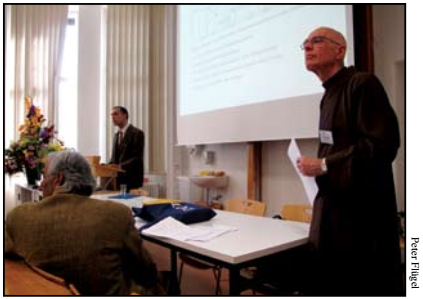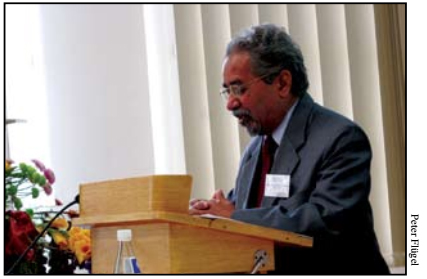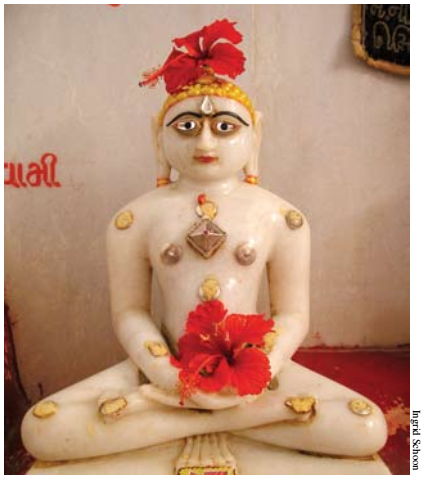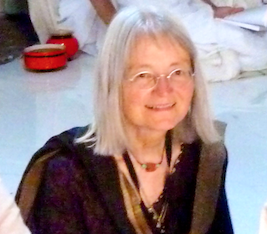
Centre of Jaina Studies Newsletter: SOAS - University of London
The DMG, German Oriental Studies Society, held its 31st Conference of Oriental Studies in Marburg, Germany, from 2024 September 2010. In the extensive frame of the most prominent conference of Oriental Studies in Germany, in the section "Indology and South Asian Studies" a panel on Jaina Studies was organised by Jayandra Soni, Department of Indology and Tibetology, University of Marburg on Thursday, 23rd September 2010. It was the first Jaina Studies panel ever held at DOT (Deutscher Orientalistentag) and thanks to the response of Jaina scholars it was the biggest within the section. Twelve participants from Austria, Great Britain, France, Japan and Germany presented papers on various fields of Jainism. A friendly autumn sun shone on that day and it was pūrṇimā.
Sreeramula Rajeswara Sarma (Aligarh University) started the day with a fascinating introduction to the Dravyaparīkṣā by Thakkura Pherū, a Jain Assayer at the court of the Khaljī Sultāns in Delhi in the first quarter of the fourteenth century. Of his six works in Apabhramśa verse on diverse scientific subjects, Sarma presented an exemplifying account of the Dravyaparīkṣā which deals with the examination of the metal content (dravya) in coins, a then very important technique for pricing them. The text is unique and very important for the research on realia.
Nalini Balbir (Sorbonne Nouvelle) presented her investigation of the case of Mantri Karmachandra, a prominent Oswal Jain of the seventeenth century. His activities for the promotion of Jainism, which are traceable from various sources, shed light on the patterns of relations between political power and the Jaina community in a given historical setting. Balbir gave an encompassing analysis of the various sources, texts and their authors and drew a multifaceted picture of the functions and the sphere of influence of this Jaina politician.
Bhikkhu Pasadika (University of Marburg) offered a detailed textual analysis of the Buddhist Kālāmasutta with relevant parallel passages from the Sāḷhasutta, especially those related to the beginnings of the Jaina syādvāda, or regarded as being a Buddhist parallel to it. He showed that the content of the Kālāmasutta is indeed epistemological as well as ethical. The famous 'know for yourselves' and the avoidance of the ten grounds that should not be gone by for ascertaining a statement's reliability, as well as the four kinds of confidence (assāsa), were linked to the non-committal attitude of the intellectually non-violent position of anekāntavāda.

Himal Trikha (University of Vienna) and Bhikkhu Pasadika (University of Marburg)

Sreeramula Rajeswara Sarma (Aligarh University)
Himal Trikha (University of Vienna) expounded the composition of the chapter on Vaiśeṣika in Vidyānandin's Satyaśāsanaparīkṣā by analysing the arguments Vidyānandin uses in discussing Vaiśeṣika doctrines. Many of these arguments are found in other philosophical treatises, corresponding to them even literally. Trika's intricate investigation into the integration of these passages in the context of the argument elucidated various realms of composition, which in turn made it possible to see the links to other philosophical works of the Jainas and to appreciate Vidyānandin's specific achievement in the discourse.
Jayandra Soni (University of Marburg) revisited Jaina Epistemology and paid special attention to erroneous cognition, which may occur not only in sensory, but also in scriptural knowledge and clairvoyance. Drawing from sūtras of the Tattvārthasūtra and two of its commentaries he developed a concise picture of the Jaina theory of error within Jaina epistemology. The term upayoga in its application as darśana and jñāna emerged as a key concept in this context.
Anne Clavel (University of Lyon) introduced the intriguing question of whether syādvāda is true only from a certain point of view and explored a possible answer from several philosophical texts by Akalaṅka and others in the course of which the term añjasā (besides paramārthataḥ and ekāntena) was given special attention. The clear-cut analysis of the significant passages concerned showed that there are meta-statements which escape the syādvāda and that the sevenfold predication draws its validity through perfect cognition, i.e., omniscience
The afternoon session, usually subdued by the low energy after lunch, started nevertheless very enjoyably with Julia Hegewald's (University of Bonn) expert examination of the sources of Jaina havelī temples in Northern India. In word and picture one could follow how the structure and style of the courtyard-house temples developed over the centuries from the initially open courtyard into a roof covered construction, creating multi-storied halls and spaces which suit the Jaina ritual requirement.
The next two presentations by Christine Chojnacki (University of Lyon) and Basile Leclere (University of Lyon) focussed on the Vibudhānanda play in Śīlāṅka's novel Caupaṇṇamahāpurisacariya and interpreted it as an innovative form in Jaina literature. Chojnacki, after summarizing the plot, analysing its structure and placing it in the context of the novel, elaborated the interesting peculiarity of inserting a dramatic text in a narrative one. This led to questions about the interaction between drama and narrative, its function, use and performance practices. The discussion about the genre was taken up by Leclere, elicited by the fact that the Vibudhānanda is a rare example of a tragic play. The use of dramatic genre depicting sad events and sorrow in human existence might, for Buddhists and Jainas, better serve their doctrinal tenets and their transmission to the audience.
Anna Aurelia Esposito (University of Würzburg) reflected on the relation between the Bṛhatkathā and Sannghadāsa's Vasudevahiṃḍī by first giving a survey of the complex story and then pointing out the way in which Guṇāḍhya's material is intertwined with the world history and value system of the Jainas.
Sin Fujinaga (Miyakonojō Kōsen) introduced Jinabhadra, whose life and work is datable fairly reliably and thus represents a definite figure for historical references with regard to Jaina philosophy and philosophers. His Bṛhatsaṃgrahaṇī indicates the reception of ideas contained in the Āgamas. Malayagiri's commentary on it is also rich in quotations from different sources and thus the two works represent an important field of research.
Peter Flügel (SOAS), as the last speaker, rounded up the day by drawing attention to a surprisingly rich and colourful area of social and literary activity: 'Praising the Living, Remembering the Dead. The Sociology of the Jaina Festschrift' was unfolded with numerous examples of this genre from different gacchas and other Jaina groupings, whose householders, monks, nuns and institutions were bestowed with volumes of praise and felicitation.
Flügel's lively talk was a fitting end to the panel. One got the impression that all the participants enjoyed the stimulating presentations and discussions.
Luitgard Soni has a PhD from the University of Salzburg, and studied Sanskrit, Indian Philosophy and Hindi at the Banaras Hindu University. She has been affiliated to the Department of Indology at the Universitiy of Marburg since 1992, teaching and researching mainly Jaina literatu re.

 Dr. Luitgard Soni
Dr. Luitgard Soni